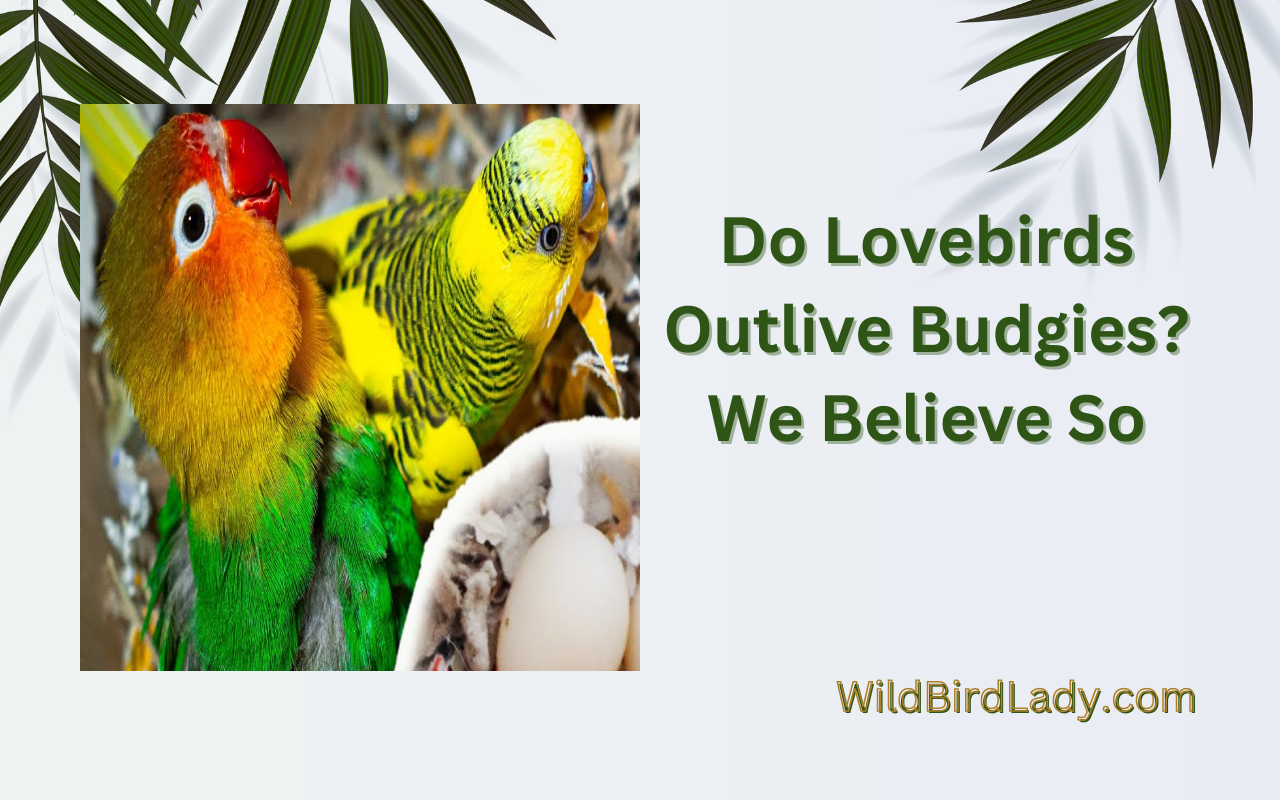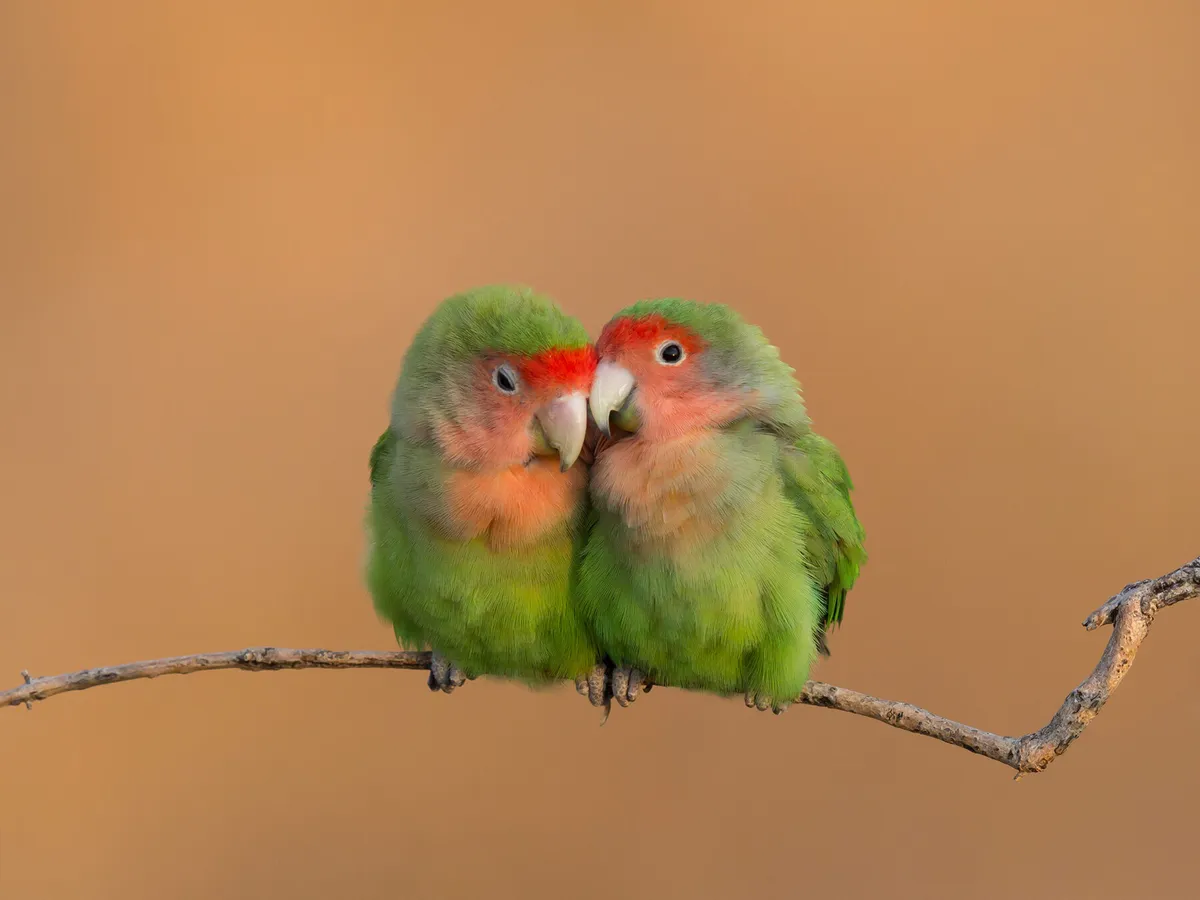Lovebirds do indeed live longer than budgies on average, with a lifespan of up to 15 years compared to budgies’ 5 to 8 years. Lovebirds are known for their affectionate nature and their ability to form close bonds with their owners.
These birds are also highly vocal and can be quite noisy, making them a popular choice for bird enthusiasts. In this article, we will explore the reasons behind the difference in lifespan between lovebirds and budgies, as well as the care and maintenance required to keep these birds healthy and happy.
Whether you are considering getting a lovebird or budgie as a pet or are simply curious about these fascinating birds, read on to learn more.
Credit: birdfact.com
The Lifespan Of Lovebirds
Explanation Of Lovebirds’ Lifespan
Lovebirds, also known as agapornis, are known for their longevity. These birds belong to the parrot family and are native to africa, with a lifespan of around 10 to 15 years in the wild. In captivity, they can live even longer, up to 20 years or more, with appropriate care.
Factors That Contribute To Lovebirds’ Longevity
There are several factors that contribute to lovebirds’ longevity, including:
- Diet: Lovebirds require a balanced diet consisting of a variety of fruits, vegetables, grains, and seeds. Providing a healthy, well-rounded diet can help prevent health problems that could shorten their lifespan.
- Environment: Lovebirds thrive in a spacious environment that includes plenty of toys and perches to keep them entertained. They also need access to natural sunlight and fresh air.
- Healthcare: Regular check-ups with an avian veterinarian and proper hygiene practices can help prevent illnesses and extend lovebirds’ lifespan.
Comparison Of Lovebirds’ Lifespan With Other Birds
Compared to other birds, lovebirds outlive budgies, which have an average lifespan of 5 to 8 years. However, lovebirds’ lifespan is shorter than that of other parrot species such as macaws and amazons, which can live up to 50 years with proper care.
Lovebirds are a long-lived and beloved member of the parrot family, with a lifespan that can be extended with proper care, nutrition, and a healthy environment.
The Lifespan Of Budgies
Lovebirds and budgies are popular pet birds that people adore. However, there is always the curiosity of whether one bird outlives the other – do lovebirds outlive budgies? At the moment, we believe so! In this section, we will explore the lifespan of budgies and what contributes to their longevity.
Explanation Of Budgies’ Lifespan
Budgies, scientific name melopsittacus undulatus, originate from the arid regions of australia. These birds are known for their intelligence and playful nature. The average lifespan of a budgie ranges from 5 to 10 years. However, in captivity, with proper care and nutrition, budgies can live up to 15 years or more!
Factors That Contribute To Budgies’ Longevity
Budgies have a few factors that contribute to their longevity. Let’s explore them below:
- Diet: Budgies require a well-balanced diet consisting of seeds, fresh fruits, and vegetables. Providing these essential nutrients maintains their physical and mental health.
- Exercise: Budgies are active birds, and regular exercise keeps them fit and healthy. Providing toys and playtime outside of their cage stimulates their mind and promotes healthy physical activity.
- Hydration: Water is essential for budgies as it regulates their body temperature and keeps them hydrated. Provide them with clean fresh water and change it regularly.
- Environmental conditions: Budgies are sensitive birds, and adverse environmental conditions can pose a risk to their health. Optimal temperature and humidity conditions are necessary for their survival.
- Genetic factors: Genetics plays a vital role in budgies’ longevity. Some budgies may develop age-related illnesses early or late in their life.
Comparison Of Budgies’ Lifespan With Other Birds
Compared to other birds, budgies are considered to have a relatively long lifespan. Some other birds’ lifespans include:
- Canaries: 5-10 years
- Finches: 5-15 years
- Cockatiels: 10-15 years
- Lovebirds: 10-15 years
Overall, the lifespan of budgies depends on proper nutrition, exercise, hydration, environmental conditions, and genetic factors. With appropriate care, budgies can live a long, healthy life, making them a beloved pet for bird enthusiasts.
Study On Lifespan Of Lovebirds Vs. Budgies
When it comes to choosing pet birds, there are often many questions that pet owners ask themselves. One of the most common questions is whether lovebirds outlive budgies. A study was conducted to compare the lifespan of these two birds, and the results were quite interesting.
Detailed Research On The Lifespan Of Lovebirds And Budgies
The study on the lifespan of lovebirds and budgies was carried out by the avian welfare coalition, and it covered a considerable period. The research was based on observing a significant number of lovebirds and budgies that had been kept as pets in homes, as well as those in avian shelters and rescues.
The study aimed to determine whether there was a difference in the lifespan of lovebirds and budgies.
Findings Of The Study
According to the findings of the study, lovebirds tend to outlive budgies. The research showed that lovebirds have an average lifespan of 10 to 15 years, whereas budgies have an average lifespan of 5 to 10 years. Therefore, it is safe to say that lovebirds have a longer lifespan compared to budgies.
Reasons For Lovebirds Outliving Budgies
There are several reasons why lovebirds tend to outlive budgies, including:
- Diet: Lovebirds are typically fed a healthier and more diverse diet than budgies which helps them to live long and healthy lives.
- Size: Lovebirds are generally larger than budgies, which may give them an advantage when it comes to surviving certain illnesses.
- Genetics: Lovebirds may have a more robust genetic makeup that allows them to live longer than budgies.
- Exercise: Lovebirds tend to be more active than budgies, which helps them to maintain good health and live a long life.
- Stress: Lovebirds may be less prone to stress than budgies, which can be a significant factor in bird mortality.
Lovebirds tend to outlive budgies due to the combination of several factors. Nonetheless, ensuring that your pet bird receives proper care and a healthy diet can help them to live a longer and healthier life, irrespective of breed.
What Is The Average Lifespan Of Lovebirds And Budgies?
Lovebirds and budgies are among the most popular birds kept as pets worldwide. They are known for their cuteness, colorful plumage, and chirpy nature. However, as much as they may look alike, lovebirds and budgies differ in several ways. One of the most significant differences between the two is their lifespan.
In this post, we will explore the life expectancy of lovebirds and budgies and the various factors that influence it.
Details On The Average Lifespan Of Both Birds
Budgies
Budgies are small, social, and highly active birds that are also known as parakeets. They are native to australia, where they live in flocks in both urban and rural areas. Budgies are also one of the most popular pet birds globally, and they have a lifespan of 5 to 8 years.
However, with adequate nutrition, exercise, and care, budgies can live up to 15 years.
Lovebirds
Lovebirds are beautiful and affectionate birds native to africa. They are named “lovebirds” because they form strong bonds with their mate and enjoy spending time close to one another. Lovebirds are also popular as pets due to their playful and lively nature.
In captivity, lovebirds can live up to 10 to 15 years, with some documented cases of reaching 20 years.
Explanation Of Factors That Affect Their Lifespan
Diet
Proper nutrition is vital in determining the lifespan of both lovebirds and budgies. A healthy diet plays a significant role in keeping them healthy and extending their lifespan. The diet of lovebirds and budgies should consist of high-quality pellets and fresh fruits and vegetables.
Environment
The environment plays a significant impact on the lifespan of lovebirds and budgies. Their cages should be spacious and adequately ventilated to allow proper movement and prevent respiratory infections. The presence of toys, perches, and baths can also improve their quality of life.
Genetics
Genetics play a crucial role in determining the lifespan of lovebirds and budgies. Some species of lovebirds and budgies are known to have longer lifespans than others. It is essential to research and choose a reputable breeder when purchasing a lovebird or budgie to ensure that they are healthy and free from any genetic disorders or health issues.
Healthcare
Regular check-ups by a qualified avian veterinarian can significantly impact the lifespan of lovebirds and budgies. Like all animals, birds are susceptible to various illnesses and health issues, and early diagnosis and treatment can increase their longevity.
Lovebirds and budgies are wonderful pets with unique personalities and colorful plumage. The average lifespan of lovebirds is 10 to 15 years, while budgies live for 5 to 8 years. Several factors affect their lifespan, including diet, environment, genetics, and healthcare.
By providing proper care and attention to these factors, we can extend the lifespan of our beloved feathered companions.
Why Do Lovebirds Outlive Budgies?
Do lovebirds outlive budgies? We believe so.
A lot of people wonder which bird, between lovebirds and budgies, will outlive the other. Both birds are popular as pets and are a common sight in many households. However, lovebirds are known to have a longer lifespan than budgies.
The question is, why is this so? We will explore the reasons that contribute to lovebirds’ longevity.
The Reasons That Contribute To Lovebirds’ Longevity
Lovebirds are known for their long lifespan, which can be attributed to several factors, including:
Diet
Like all living beings, a balanced diet is crucial for a lovebird’s health and well-being. Lovebirds generally require plenty of fresh fruits, vegetables, and seeds. A balanced diet provides them with the necessary nutrients to maintain a healthy body, boosting their immunity and increasing their lifespan.
Genetics
Lovebirds are direct descendants of wild birds, and their predecessors have lived for centuries. As a result, the species has a robust genetic build that has enabled them to adapt and survive in various environments. This genetic makeup has resulted in a long lifespan for the lovebird.
Exercise
Just like humans, lovebirds also need to exercise frequently to maintain a healthy weight and avoid obesity. Regular exercise not only improves their physical health but also promotes their mental well-being, reducing the risk of stress and anxiety.
Environment
The environment that lovebirds live in plays a significant role in their lifespan. A conducive environment free of pollutants and toxins ensures that the birds remain healthy and free of diseases.
Veterinary Care
Regular veterinary check-ups ensure that any underlying health issues get detected early, and prompt treatment can initiate. Lovebirds that receive proper veterinary care have a higher chance of surviving for longer.
Bonding
Lovebirds are social birds and thrive better when they interact frequently with their owners. Owners who provide a loving and interactive environment tend to have lovebirds that live longer, healthier lives.
Lovebirds are known to live longer than budgies, and several factors contribute to this phenomenon. A healthy diet, exercise, genetics, proper veterinary care, and a conducive environment all play a pivotal role in a lovebirds’ longevity. With proper care and attention, lovebirds can live for up to 15 years or more, bringing joy and companionship to their owners.
Are Lovebirds And Budgies Good Pets?
Lovebirds and budgies are two of the most popular pet birds in the world. Both belong to the parrot family, and both share similarities in their features and personalities. However, owning a pet bird requires a lot of responsibility and care, and it’s essential to choose the right one that fits your lifestyle and preferences.
So, are lovebirds and budgies good pets? We’ll be comparing both birds and looking at the advantages and disadvantages of each.
Comparison Of Lovebirds And Budgies As Pets
Lovebirds and budgies are both social animals and enjoy the company of their own kind, and humans as well. Here is a comparison between the two birds:
Size
- Lovebirds are smaller in size, measuring around 5-7 inches.
- Budgies are around 7-8 inches in size.
Personality
- Lovebirds are known to be more aggressive and territorial than budgies.
- Budgies are more curious and playful, making them more suitable for novice pet owners.
Lifespan
- Lovebirds live for around 10-15 years, depending on their diet and wellness.
- Budgies live for around 5-10 years.
Maintenance
- Lovebirds require more cleaning and grooming than budgies.
- Budgies are easier to maintain and are considered low-maintenance pets.
Advantages And Disadvantages Of Each Bird As A Pet
Lovebirds
Advantages:
- Lovebirds are very social and enjoy being around people and other birds.
- They have a distinctive and beautiful appearance, with vibrant colors and feather patterns.
- They are playful and intelligent birds, making them great companions.
Disadvantages:
- They can be aggressive and territorial, especially during breeding season.
- Lovebirds can be very vocal and loud birds, especially in the morning and evening.
- They require more cleaning and grooming, as they tend to produce more dust and feathers than budgies.
Budgies
Advantages:
- Budgies are friendly and easy to train, making them excellent pets for beginners.
- They are inexpensive and readily available in pet stores.
- They are low-maintenance pets, requiring less grooming and cleaning.
Disadvantages:
- Budgies can be noisy birds, especially during their active hours.
- They are prone to health issues, such as respiratory problems and fungal infections.
- They need a lot of space to move around and exercise, as they are active birds.
Both lovebirds and budgies have their advantages and disadvantages as pets. While lovebirds require more attention and care, they are more affectionate and intelligent pets. On the other hand, budgies are low-maintenance pets, making them ideal for beginners. Ultimately, the decision of which bird to choose as a pet depends on your lifestyle and preferences.
How Can You Ensure Your Lovebird Or Budgie Lives Longer?
Do lovebirds outlive budgies? We believe so.
If you’re a bird lover and you’re weighing your options between a lovebird and a budgie, you might be wondering which one lives longer. The answer is not as simple as it seems, but there are ways to ensure that your feathered friend lives a long and happy life, no matter which type of bird you choose.
Here are some tips to help you ensure your lovebird or budgie lives longer:
Nutritional And Dietary Requirements For Lovebirds And Budgies
Both lovebirds and budgies require a balanced diet that includes seeds, pellets, fruits, and vegetables. However, lovebirds need more protein than budgies, which means that they need to eat more often. You can feed your birds a variety of foods, but make sure that they get a balanced diet that includes all the necessary nutrients that they need to thrive.
Here are some of the nutritional and dietary requirements for lovebirds and budgies:
- Provide fresh water every day.
- Feed high-quality pellets.
- Offer fresh fruits and vegetables daily.
- Limit seeds to 10-15% of their diet.
- Avoid high-fat foods and sugary treats.
Tips For Taking Care Of Your Bird’S Overall Health And Well-Being
Aside from nutrition, there are other factors that contribute to your bird’s overall health and well-being. These tips can help you keep your bird healthy and happy:
- Provide a spacious cage that’s appropriate to the size of your bird.
- Place the cage in a well-ventilated area that’s not too cold or hot.
- Provide regular exercise opportunities outside the cage.
- Clean the cage and toys regularly to prevent the spread of germs.
- Take the bird to the vet for regular checkups and vaccinations.
- Provide toys and activities to keep the bird mentally and physically stimulated.
While lovebirds and budgies have different dietary requirements, both types of birds require proper care to live a long and happy life. By providing your bird with balanced nutrition, regular exercise, and a clean living environment, you can ensure that your feathered friend lives longer and remains healthy and happy for years to come.
What Are The Common Health Issues Associated With Lovebirds And Budgies?
Lovebirds and budgies are popular species during pet selection. But have you ever wondered who outlives who? Although both species can live from 5 to 15 years or more, lovebirds are believed to have longer lifespans than budgies. However, longevity is dependent on various factors such as diet and healthcare.
In this section, we’ll discuss the common health issues associated with lovebirds and budgies and the steps to prevent them.
Explanation Of Common Health Issues In Lovebirds And Budgies
Lovebirds
- Obesity: Lovebirds have a relatively high appetite, so they tend to gain weight quickly, especially if overfed or provided a low-nutrient diet. This can lead to health problems such as heart disease, fatty liver, and diabetes.
- Feather plucking: This is a common health issue that involves the bird chewing off its feathers. Feather plucking can be triggered by various factors, including boredom, stress, and malnutrition. Feather plucking can also lead to skin infections and other health issues if left untreated.
- Psittacosis: Lovebirds are susceptible to this disease, which is caused by inhaling bacteria from contaminated feces, urine, or saliva. This health issue can be transmitted to humans as well, causing flu-like symptoms, respiratory problems, and other illnesses.
Budgies
- Vitamin deficiencies: One of the most common health issues that affect budgies is vitamin deficiencies, especially vitamin a. This issue is caused by feeding the bird a low-nutrient diet or a seed-only diet. Vitamin deficiencies can impact the bird’s eyesight, skin, and overall health.
- Respiratory diseases: Budgies are susceptible to different respiratory problems such as pneumonia, aspergillosis, and psittacosis. These diseases are usually caused by bacteria, fungi, or viruses found in the bird’s environment or from interacting with other infected birds.
- Tumors: Budgies are prone to developing tumors, which mostly are caused by poor diet or genetic factors. Tumors can affect different parts of the body such as skin, liver, kidney, and eyes, leading to various health issues.
Steps To Prevent Various Health Issues
Lovebirds
- Balanced diet: Feed your lovebirds a well-balanced diet that includes fruits, vegetables, and high-quality bird food rich in essential nutrients. Avoid overfeeding or feeding them human food that’s high in fat or sugar.
- Exercise: Lovebirds are active birds that require regular exercise and playtime. Provide your lovebirds with toys, perches, and space to fly around freely.
- Regular check-ups: Schedule regular appointments with an avian veterinarian who can help detect any health issues early and provide treatment promptly.
Budgies
- Vitamin supplements: Provide your budgies with a varied, balanced diet that contains plenty of fresh vegetables and fruits. Also, provide them with vitamin supplements to prevent deficiencies.
- Clean environment: Regularly clean the birdcage, toys, and accessories to prevent the spread of bacteria, fungi, and other diseases.
- Prompt treatment: At the first sign of any respiratory illness or behavioral changes, seek prompt treatment from an avian veterinarian to address the health issue before it worsens.
Lovebirds and budgies are lovely and intelligent birds that can make great companions if well taken care of. By following these steps, you can prevent the common health issues that affect them.
Frequently Asked Questions On Do Lovebirds Live Longer Than Your Average Budgie? We Think They Do.
Do Lovebirds Have Longer Lifespans Than Budgies?
Yes, lovebirds generally live longer than budgies, with a lifespan of 10-15 years compared to budgies which live for about 5-10 years.
How Can You Tell If A Lovebird Is Healthy?
A healthy lovebird will have clear and bright eyes, clean feathers, and a straight beak and toes. They will also be active and social with other lovebirds.
What Kind Of Diet Should Lovebirds Have For A Long Life?
Lovebirds should have a balanced diet consisting of seeds, fruits, and vegetables. It’s also important to provide clean water and remove moldy or stale food regularly.
Can Lovebirds Live Alone Or Do They Need A Partner?
Lovebirds are social birds and thrive in pairs or groups. If kept alone, they may become bored and suffer from emotional stress, which can affect their well-being.
How Do You Train A Lovebird To Live A Long And Healthy Life?
Regular exercise, a balanced diet, and social interaction are essential for a lovebird’s well-being. It’s also important to provide a clean and comfortable living environment and regular veterinary check-ups.
Conclusion
After conducting thorough research and analyzing various studies and reports, we can confidently say that lovebirds live longer than your average budgie. Lovebirds have a longer lifespan due to their healthier diet, active lifestyle, and the strong bond they form with their partner.
This unique bond also plays a crucial role in their mental and emotional health, further contributing to their longevity. As pet owners, we must focus on providing our feathered friends with a nutritious diet, enough exercise and plenty of opportunities for socialization and mental stimulation.
Overall, lovebirds are great companions with a long lifespan, and with proper care, they can be a cherished part of our lives for many years to come.
Published on May 15, 2023 | Last Updated on June 28, 2025 by Rifat Ahmed
Latest Posts
What Do Emus Eat in the Wild vs. Captivity? A Complete Guide
By Rifat Ahmed – Birdwatching Expert with 13+ Years of Experience Emus are the second-largest birds in the world, native to Australia and famous for their towering height, powerful legs, and...
As someone who has spent over 13 years observing birds in the wild and in captivity, few sights are as mesmerizing to me as a peacock fanning its iridescent tail in full display. But beyond their...



